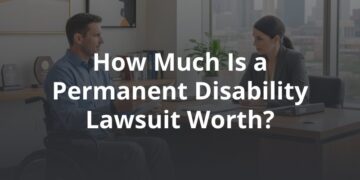While no law in Texas specifically requires wet floor signs, property owners do have a duty to keep premises free of potential injury risks. If a prudent property owner had used a wet floor sign, placed it in a different location, or otherwise done something differently to prevent a slip and fall accident in Austin, Texas, the victim may be able to recover financial compensation. Consulting with an Austin personal injury lawyer can help determine the best course of action for seeking justice and compensation.
Wet Floor Signs Are a Matter of Civil – Not Criminal – Law
Wet floor signs and the potential consequences of not using them are a matter of civil law, not criminal. It is not against the law for a property owner not to use wet floor signs. However, if an owner does not properly warn of a risk posed by a wet floor, he or she could face civil liability for any related visitor injuries.
To hold a property owner liable for a slip and fall accident caused in part by a lack of warning signage, an injured victim (known as the plaintiff) will have to prove the following elements:
- The property owner or controller owed the victim a duty of care.
- The property owner breached or violated the duty of care.
- The property owner’s breach of duty directly caused the slip and fall accident or injury.
- The victim suffered actual damages as a result of the accident.
If a property owner is found to be liable for a slip and fall accident or another injury due to a failure to maintain a safe premises, including a failure to properly use wet floor signs, he or she can be held financially responsible for the victim’s related losses. Consulting with an Austin slip and fall lawyer can help victims pursue the compensation they deserve.
What Are a Property Owner’s Legal Duties of Care?
In Texas, there is a broad responsibility or duty of care imposed on property owners to keep their premises safe and free from potential hazards. However, the specific duties that a property owner has vary based on the type of visitor.
There are three visitor classifications:
- Invitee: someone who enters a property for a business purpose, such as a customer at a store. Invitees are owed the highest standards of care. A property owner must regularly inspect the property, repair any discovered or known hazards, and warn of dangers that might not be obvious.
- Licensee: someone who enters a property for his or her own purposes, such as a social guest or a salesperson. A property owner must remedy known hazards and warn of potential dangers but does not have the duty to inspect the property.
- Trespasser: someone who enters a property without the owner’s permission or legal authorization. Property owners in Texas do not owe any duties of care to trespassers unless they are minors under the age of 18.
If someone gets injured in a slip and fall accident in Texas, an investigation will be conducted to determine whether the property owner should have done more to prevent the fall. This may include the correct use of wet floor signs to warn a visitor of a slippery surface, as well as other measures that could have improved the safety of the premises.
How Can Property Owners Prevent Slip and Fall Accidents?
If a store or business has wet or slippery floors that present a slip and fall hazard, it has a legal obligation in Texas to take adequate measures to prevent harm to customers. What is “adequate” depends on the circumstances and what another property owner would likely do in the same or similar circumstances.
Examples of measures that could be taken to prevent slip and fall accidents include:
- Placing “Warning: Wet Floor” signs in appropriate places
- Using other clear signage and markings to indicate hazards
- Putting up signs inside when it is raining outside
- Mopping up spills or food debris in a timely manner
- Warning customers when floors have just been mopped or waxed
- Periodically cleaning and inspecting the premises
- Providing adequate lighting
- Installing sturdy handrails on all staircases
- Using nonslip flooring tiles to reduce risk
- Properly storing items to prevent clutter
In a slip and fall accident claim in Texas, a judge or jury will determine if the property owner should have done more to prevent the accident. If they deem that a reasonably prudent owner would have implemented wet floor signs or taken other measures to prevent the accident, the property owner could be held financially responsible for a victim’s injuries.
When Is a Wet Floor Sign Not a Sufficient Warning?
A wet floor sign must have clear writing and be placed in a visible location that is appropriate for the hazard. If the sign was not clear or obscured from view, it may be insufficient to protect the property owner from liability for an accident.
Simply putting up a caution or wet floor sign may not be enough to shield a property owner from liability for a slip or trip and fall accident in Texas. If another property owner would have taken further action, the owner could still be held accountable.
How to Prove a Slip and Fall Accident Claim in Texas
If you get injured in a slip and fall accident and wish to hold someone responsible, start by contacting an attorney. A lawyer will review your case and let you know if you have grounds to file a premises liability claim against a property owner. If so, your lawyer can preserve and collect evidence to support your claim.
As the plaintiff or filing party in a premises liability case, you must prove the elements required as more likely to be true than not true. An attorney can help you meet this burden of proof by gathering evidence such as incident reports, property maintenance logs, eyewitness statements, and pictures and videos. Your lawyer can also hire experts to testify, if necessary.
If the property owner should have used wet floor signs to warn you of a slip and fall risk, your attorney can use a lack of signage as evidence to prove liability. If there was a sign but it was incorrectly placed or insufficient to warn you of the hazard, this can also provide proof against the property owner.
Involved in a Wet Floor Sign Slip and Fall Case? We Can Help
If you or a loved one was recently injured in a slip and fall accident in Austin, Texas and your case involves a wet floor sign (or lack thereof), contact the attorneys at FVF Law Firm – Injury & Wrongful Death Lawyer for legal assistance. Our Austin premises liability lawyers have over 100 years of combined legal experience. We offer free initial case consultations. Call (512) 982-9328 today.
Other Practice Areas We Handle
In addition to handling slip and fall cases, our team is experienced in various other practice areas. If you need an Austin car accident attorney, our experts can help you navigate the complexities of car accident claims. For those involved in commercial vehicle accidents, our Austin truck accident attorney services provide comprehensive legal support to secure fair compensation. If you are dealing with the loss of a loved one due to negligence, our Austin wrongful death attorney can guide you through the legal process to achieve justice and financial relief for your family.








